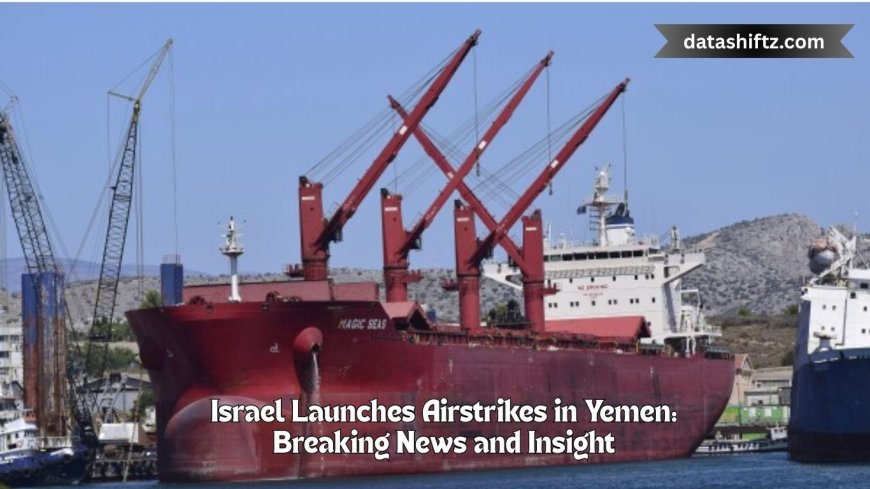Israel Launches Airstrikes in Yemen: Breaking News and Insight

In a dramatic escalation of Middle Eastern tensions, Israel reportedly conducted airstrikes in Yemen today. This latest development signals a deepening of conflict dynamics in the region, raising concerns about broader geopolitical implications. This article provides a detailed overview of the strike, contextual background, and potential consequences for regional stability.
Background: The Israel-Yemen Conflict Context
Yemen, long mired in civil war since 2014, has become a battleground for proxy conflicts involving regional powers. The Houthi movement, which controls large portions of Yemen including the capital Sanaa, has been accused of receiving support from Iran—a key adversary of Israel. Israel views Iranian influence in Yemen as a direct threat to its security, given Yemen’s strategic location by the Bab-el-Mandeb strait, a crucial maritime chokepoint.
Israel-Yemen Tensions
| Aspect | Details |
|---|---|
| Location | Yemen, particularly Houthi-controlled areas in northern Yemen |
| Main actors | Israel, Houthis, Iran (indirectly) |
| Strategic importance | Proximity to Red Sea shipping lanes; influence over Bab-el-Mandeb strait |
| Historical conflicts | Proxy wars involving Iran and Israel through regional actors |
| Recent escalation | Israel’s airstrikes in Yemen, purportedly targeting weapons shipments and Iranian assets |
Today’s Airstrike: What Happened?
According to multiple sources, Israel launched an airstrike on several Houthi-controlled targets in Yemen earlier today. While official Israeli statements remain limited, Yemeni media and regional observers report that the strikes targeted weapons depots and missile manufacturing sites allegedly linked to Iranian arms shipments.
Details of the Airstrike
-
Time: Early morning hours local time
-
Targets: Weapons storage facilities, missile production sites, and logistics hubs
-
Casualties: Preliminary reports mention casualties among Houthi militants; exact figures remain unconfirmed
-
Israeli Official Position: No formal confirmation; Israel rarely acknowledges specific operations outside its borders
Why Did Israel Strike Yemen?
Israel's motivations can be summarized as follows:
-
Prevent Iranian Military Entrenchment: Limiting Iran's ability to arm and supply Houthi forces.
-
Protect Maritime Routes: Ensuring the security of the Bab-el-Mandeb strait from hostile forces.
-
Demonstrate Regional Military Reach: Signaling to adversaries Israel’s capability to project power far beyond its borders.
Implications of the Strikes
The airstrike in Yemen is likely to have multifaceted repercussions in the Middle East:
Regional Security and Diplomatic Fallout
-
Increased Hostilities: The strikes could provoke retaliation by the Houthis or their Iranian backers, potentially expanding conflict zones.
-
International Reactions: Global powers may call for restraint; however, alliances and rivalries complicate unified responses.
-
Humanitarian Concerns: Yemen’s fragile humanitarian situation might worsen due to increased military activity.
Strategic Shifts
-
Israel’s decision to target Yemen directly indicates a shift toward more aggressive preemptive measures against perceived Iranian encroachments.
-
It signals a broadening of the Israel-Iran proxy conflict beyond traditional hotspots like Syria and Lebanon.
Elements of Today’s Yemen Airstrike
| Element | Description |
|---|---|
| Date | Today (specific date to be inserted based on news timing) |
| Perpetrator | Israeli Air Force (unofficial, widely reported) |
| Targets | Houthi missile sites, weapons depots |
| Casualties | Unconfirmed; militant casualties reported |
| Strategic Objective | Disrupt Iranian arms supply; safeguard maritime routes |
| Potential Risks | Retaliation by Houthis/Iran, escalation of regional conflict |
Potential Consequences to Watch
-
Escalation of Yemen Conflict: Could lead to wider fighting between Iran-backed Houthis and Israel.
-
Regional Proxy Warfare Intensification: More countries might be drawn into indirect conflict.
-
Disruption of Maritime Traffic: Increased risks to commercial shipping through the Red Sea.
-
International Diplomatic Strain: Heightened tensions between global powers invested in Middle Eastern peace.
-
Humanitarian Crisis Deepening: Additional military operations may exacerbate civilian suffering in Yemen.
Conclusion
Israel’s reported airstrikes in Yemen mark a significant escalation in an already complex and volatile regional conflict. While Israel aims to curb Iran’s influence and secure strategic maritime routes, the move risks broadening the scale of confrontation. Observers will closely monitor responses from the Houthis, Iran, and international actors to assess how this incident shapes the fragile security landscape of the Middle East.
The evolving situation underscores the intricate interplay of regional rivalries and the precarious balance of power that defines Middle Eastern geopolitics today. As events unfold, global stakeholders must weigh the need for security with the urgent demand to prevent further humanitarian catastrophe in Yemen.





























